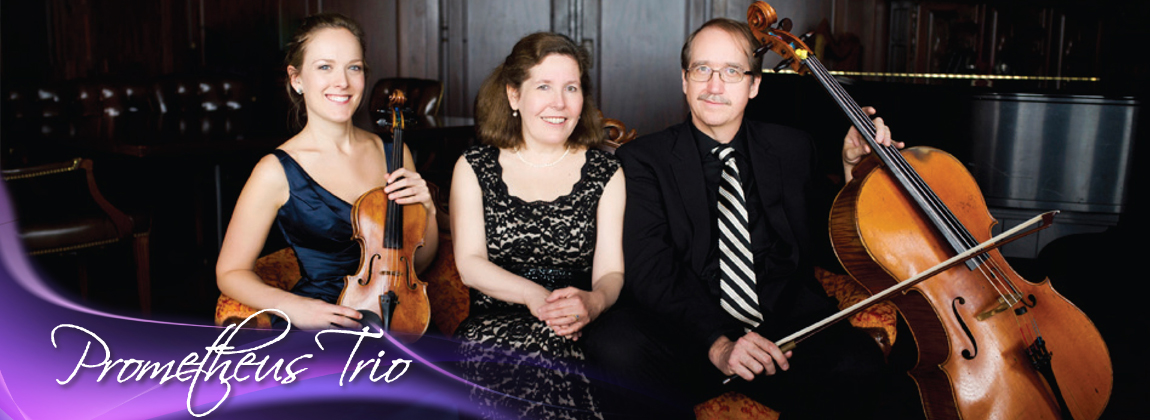Brahms, Haydn and… Lajtha?
Prometheus Trio performs two classics and a 1920s work by Hungarian composer.
The Prometheus Trio, resident piano trio of the Wisconsin Conservatory of Music, opens their season next Monday and Tuesday with a familiar formula for their series. The concert will open with a work by Joseph Haydn, who established the form of the classical piano trio. And it will close with a trio by Johannes Brahms, who may be said to have perfected the form more than 100 years later. The audience will also be treated to a 20th Century work by a composer likely unknown to most – Hungarian composer László Lajtha. Now in their eighteen season as the Prometheus Trio, pianist Stefanie Jacob and cellist Scott Tisdel are entering their third year with violinist Margot Schwartz.
The Haydn trio, Trio in G minor, Hob. XV:1, was written as a harpsichord trio some time before 1766. It’s pedigree is questioned. But Jacob asserts “it’s most certainly Haydn just because of its inventive quality.” Written before the forte-piano was available, dynamics (loud and soft) are less important than the rhythm, good humor and joyous energy.
Brahms has long been a Prometheus favorite – complicated by the fact that Brahms rarely published more than a few works in any format. Three piano trios and two others that substitute violin for clarinet or horn for cello have been routinely a part of Prometheus seasons. The Prometheus Trio will play Brahm’s second trio, Trio in C Major, Op. 87 (1883). Jacob quotes biographer Karl Geiringer to support her case for favoring this Brahms composition;
“The introductory movement…contains not a note too much or too little, and the whole piece develops in such a natural manner that one could almost believe that Brahms had nothing more to do, after working out the first few bars, than to complete the movement in accordance with the inner laws of its themes.”
The second trio, written well into Brahm’s career, is full of lovely romantic melodies, a touch of Hungarian folk song and a complex, balanced conversation among the players. Critic Melvin Berger observes that “the music explores a wide emotional range – from surging passions to ghostly whispers, from stirring pronunciamentos to tender sentiments.” The contrast with an early harpsichord work from the 18th century could not be more complete.
The Prometheus Trio discovered Lajtha almost by accident when acquiring a disk of other music they were interested in. They located the score with the help of the Takács Piano Trio, who had made the original recording of an unpublished composition. A Hungarian composer deeply rooted in the musical folk traditions of Hungary, Lajtha has developed a reputation for his symphonic music. I find Lajtha’s chamber work on the program – Trio Concertant, Op. 10 (1928) – to be a very approachable, infectious work. The composition can not be confused with avante-guarde works of the 1920s. Instead, the composer may be identified with neo-classicism, honoring the structures of Baroque style, mining folk melodies for inspiration and featuring each player in turn as soloists in a quasi-concerto format.
You may preview each of the works on the program on this Youtube playlist.
The Prometheus Trio performs in the intimate setting of the Conservatory mansion’s ballroom. The room is an audience delight, but fans of the Prometheus have long outgrown the space, requiring two presentations – Monday, September 18 and Tuesday, September 19 at 7:30 p.m.
Tickets may purchased on-line or at 414-276-5760. Single tickets range from $17.50 (student) to $27.50 (general), with front row seats reserved for $37.50. Save 20% by purchasing or converting to a four concert series subscription.
The Conservatory’s location at 1584 N. Prospect Avenue conjures images of difficult parking, but an arrangement with Milwaukee Eye Car, allows convenient complementary parking at 1684 N. Prospect Avenue, just one block north.
The Prometheus Trio plays their second concert at the Conservatory on December 4th and 5th. Benjamin Adler, Assistant Principal Clarinetist with the Milwaukee Symphony Orchestra joins them for a major 20th Century work Olivier Messiaen‘s Quartet for the End of Time. A Ludwig van Beethoven Trio – Op. 70, No. 2 in E-flat completes the concert.


















